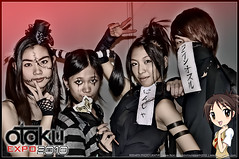JAPAN
05 June 2014
Wrong About Japan
"When I grow up I'm going to live in Tokyo".
"When I grow up I'm going to live in Tokyo". With this declaration to his father, Peter Carey, Charley instigated their trip to Tokyo -- and inspired Carey's book about the trip, "Wrong About Japan".
"No Real Japan," insisted the normally shy Charley to the twice Booker Prize winning author. "You've got to promise. No temples. No museums."
It was only when they arrived at Tokyo's Narita airport that Charley confessed that he had made a Japanese friend on the Internet who would visit them at their hotel. Takashi-san had black hair that stood up in dramatic triangular sections. He wore a high-necked Cambridge blue jacket with what might have been called a Mao collar, and which glistened with gold buttons. His trousers were jet black, his boots knee high.
This was Charley-san's Japan -- the world of manga and anime -- artists and directors of which they met during much of their week in Tokyo.
Carey-san was quickly made aware of his inability to even break the skin of Japanese culture. Takashi-san asked if he had seen pictures of Japanese temples with rocks and gravel, nice Japanese rooms and houses with rough timber. Then Takashi-san took great delight in telling him that this was not the Real Japan.
And when he asked Yoshihara-san if making a sword was a spiritual business to him, he received the smiling response "You've been reading American books?"
Carey-san also found that the more you try to pin down the word otaku -- usually translated as geek or nerd -- the more wriggly it becomes. As Kosei Ono warned him, it is better to know nothing than a little. They may, however, have met a real otaku in the form of Yuka Minakawa, an attractive, gym-toned young women in a yellow dress and fuck-me heels.
Carey-san broke his promise by dragging Charley-san to a tortuous four hours of kabuki. But as Takashi-san said, "my grandmother likes kabuki."
As they were leaving, Charley-san delivered a present for Takashi-san to his grandmother. The Careys were astonished that the grandmother should kiss Charley-san. Japanese usually don't kiss.
"Must be the Real Japan", said Charley-san. "Let's get out of here before we learn we're wrong."
In this charming little travel tale, young Charley, without the burden of Western preconceptions, is better able to penetrate Japan than his over-intellectualizing father. But their different connections to Japanese culture provide the basis for a touching dialogue and bonding between Carey and Charley.
This is a great little book to read before a visit to Japan -- or perhaps even better after a visit, when you have some exposure to the mysteries of this wonderful country.
"No Real Japan," insisted the normally shy Charley to the twice Booker Prize winning author. "You've got to promise. No temples. No museums."
It was only when they arrived at Tokyo's Narita airport that Charley confessed that he had made a Japanese friend on the Internet who would visit them at their hotel. Takashi-san had black hair that stood up in dramatic triangular sections. He wore a high-necked Cambridge blue jacket with what might have been called a Mao collar, and which glistened with gold buttons. His trousers were jet black, his boots knee high.
This was Charley-san's Japan -- the world of manga and anime -- artists and directors of which they met during much of their week in Tokyo.
Carey-san was quickly made aware of his inability to even break the skin of Japanese culture. Takashi-san asked if he had seen pictures of Japanese temples with rocks and gravel, nice Japanese rooms and houses with rough timber. Then Takashi-san took great delight in telling him that this was not the Real Japan.
And when he asked Yoshihara-san if making a sword was a spiritual business to him, he received the smiling response "You've been reading American books?"
Carey-san also found that the more you try to pin down the word otaku -- usually translated as geek or nerd -- the more wriggly it becomes. As Kosei Ono warned him, it is better to know nothing than a little. They may, however, have met a real otaku in the form of Yuka Minakawa, an attractive, gym-toned young women in a yellow dress and fuck-me heels.
Carey-san broke his promise by dragging Charley-san to a tortuous four hours of kabuki. But as Takashi-san said, "my grandmother likes kabuki."
As they were leaving, Charley-san delivered a present for Takashi-san to his grandmother. The Careys were astonished that the grandmother should kiss Charley-san. Japanese usually don't kiss.
"Must be the Real Japan", said Charley-san. "Let's get out of here before we learn we're wrong."
In this charming little travel tale, young Charley, without the burden of Western preconceptions, is better able to penetrate Japan than his over-intellectualizing father. But their different connections to Japanese culture provide the basis for a touching dialogue and bonding between Carey and Charley.
This is a great little book to read before a visit to Japan -- or perhaps even better after a visit, when you have some exposure to the mysteries of this wonderful country.




